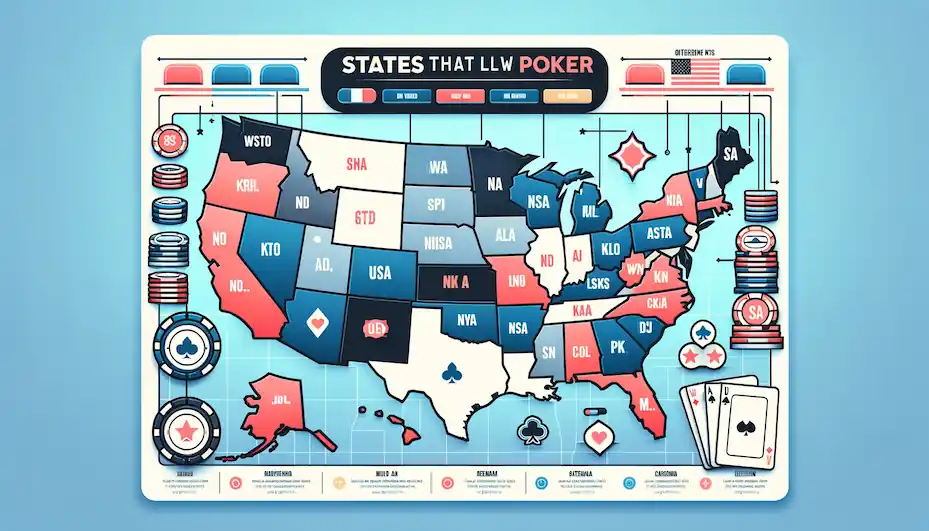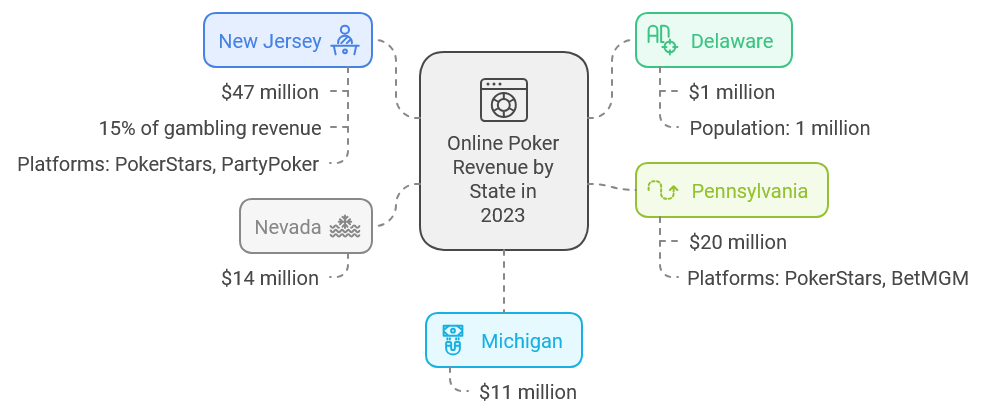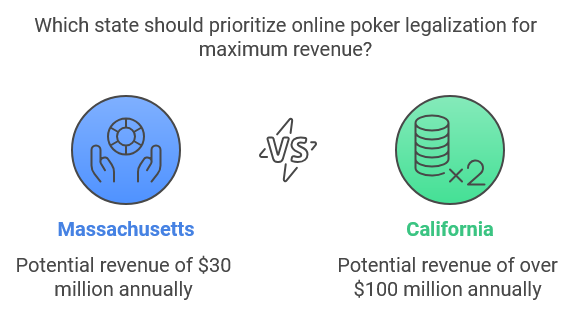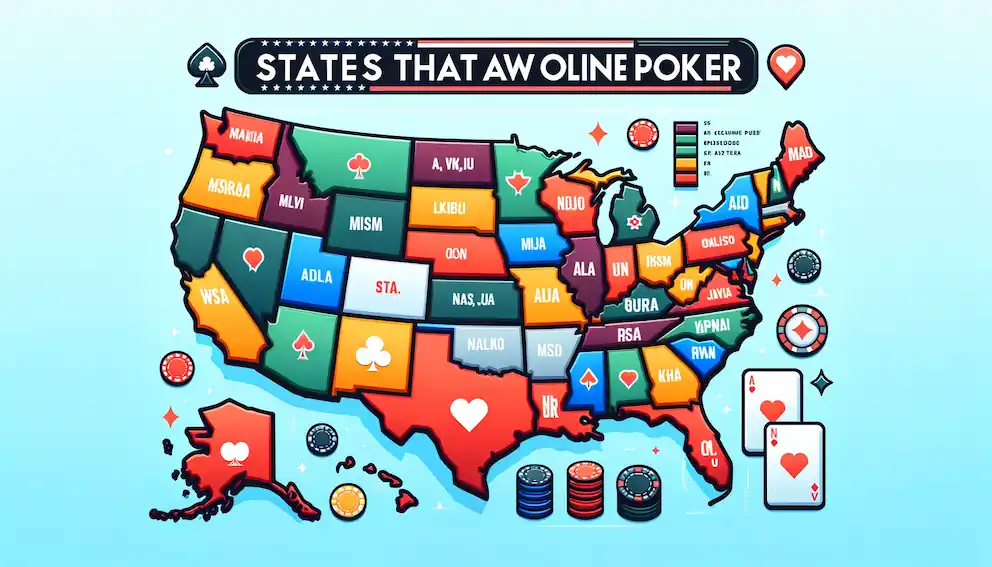What states allow online poker in 2024?
The landscape of online poker in the United States is complex and ever-evolving, shaped by a combination of federal laws and individual state regulations.
When exploring the topic “what states allow online poker,” it is essential to understand the dynamic and varied legal landscape across the United States, where a select number of states have moved forward to regulate and authorize online poker within their jurisdictions.
While online poker is not universally legal across the country, several states have moved forward with legislation to allow and regulate it within their borders.
Understand in short: As of 2024, the states that allow and regulate online poker are Nevada, New Jersey, Delaware, Pennsylvania, Michigan, and West Virginia.
This article on wolfcasinoguide.com explores which states allow online poker, detailing the legal frameworks, historical contexts, and future prospects for online poker legislation in the USA.
Table of Contents
The Federal Legal Framework
Before diving into the specifics of what states allow online poker, it is essential to understand the federal legal backdrop that influences state decisions. The primary federal laws affecting online poker include:
- Unlawful Internet Gambling Enforcement Act (UIGEA) of 2006: UIGEA prohibits financial institutions from processing transactions related to online gambling. However, it does not explicitly criminalize the act of playing online poker.
- Federal Wire Act of 1961: Initially aimed at curbing organized crime, the Wire Act prohibits certain types of gambling activities across state lines. Its interpretation has varied, but a 2011 Department of Justice opinion clarified that the Act applies only to sports betting, opening the door for states to regulate other forms of online gambling, including poker.
- Professional and Amateur Sports Protection Act (PASPA) of 1992: Although primarily focused on sports betting, PASPA’s repeal in 2018 by the Supreme Court has emboldened states to explore various forms of online gambling.
These federal laws create a framework within which states must operate as they consider legalizing and regulating online poker.

States That Allow Online Poker
Currently, there are a few states where online poker is explicitly legal and regulated. These states have established frameworks for licensing and regulating online poker operators, providing a safe and legal environment for players.
1. Nevada
Nevada, the first state to legalize online poker, passed legislation in 2013 allowing it. Known for its robust gaming industry, Nevada offers regulated online poker primarily through sites like WSOP.com. The state has also entered into interstate compacts, allowing players to compete against those in other regulated states, enhancing liquidity and game variety.
The state reported $14 million in online poker revenue in 2023, indicating steady interest despite limited options.
2. New Jersey
New Jersey followed Nevada by legalizing online poker in 2013. The state’s Division of Gaming Enforcement oversees the regulation of online poker, with several platforms operating under the licenses of Atlantic City casinos.
New Jersey has become a significant player in the online poker market, thanks in part to its partnership with other states for shared player pools.
New Jersey is a leader in the online poker market, generating over $47 million in online poker revenue in 2023, thanks to multiple platforms like PokerStars and PartyPoker. The state has approximately 15% of its gambling revenue coming from online poker.
3. Delaware
Delaware legalized online poker in 2013 through its Delaware Gaming Competitiveness Act. The state’s three racinos (casino-racetrack hybrids) offer online poker, sharing liquidity with Nevada and New Jersey to provide a more vibrant playing field.
Delaware offers a smaller online poker market with a combined revenue of around $1 million across its three licensed operators. The state has a population of about 1 million, making it a niche market for online poker.
4. Pennsylvania
Pennsylvania joined the online poker landscape in 2017 with the passage of a comprehensive gambling expansion bill.
The Pennsylvania Gaming Control Board regulates the market, and online poker went live in the state in 2019.
Pennsylvania’s online poker market has grown rapidly since its launch in 2019, generating over $20 million in revenue in 2023. It ranks as the third-largest market for online poker in the U.S., supported by platforms like PokerStars and BetMGM.
5. Michigan
Michigan legalized online poker in 2019 through the Lawful Internet Gaming Act, with operations beginning in early 2021.
The Michigan Gaming Control Board oversees the regulation, and the state has been active in seeking interstate compacts to enhance its online poker ecosystem.
Michigan saw revenues reach approximately $11 million by the end of 2023.

6. West Virginia
West Virginia passed legislation in 2019 to allow online poker through the West Virginia Lottery Interactive Wagering Act.
While online poker platforms have yet to launch as of early 2024, the legal framework is in place, and operators are expected to begin offering services soon.
States Considering Legislation
Several other states are in various stages of considering or implementing legislation to allow online poker. The legislative environment is dynamic, with potential changes on the horizon.
1. New York
New York has seen multiple legislative efforts to legalize online poker, although none have yet succeeded. Bills have been introduced regularly, reflecting growing support among lawmakers and the public. The state’s substantial population and interest in gambling make it a prime candidate for future online poker legalization .
New York is actively considering online poker legislation, with public support at around 60% among residents for legalization, which could lead to significant revenue similar to New Jersey’s market.
2. Illinois
Illinois has made strides in expanding its gambling laws, including discussions about online poker. While no legislation has passed to date, the state’s history of gambling expansion suggests that online poker could become a reality in the near future.
The state’s population exceeds 12 million, indicating a potentially large market if legalized.

3. Massachusetts
Massachusetts has also considered online poker as part of broader gambling expansion discussions. The state’s success with land-based casinos and interest in new revenue streams make it a likely contender for future online poker legislation.
Massachusetts is exploring options for legalizing online poker, with different studies showing that residents could generate up to $30 million annually if regulated.
4. California
California, with its massive population and active poker community, has long been seen as a potential leader in online poker legalization.
California has been discussing online poker legislation for years, with estimates suggesting that a regulated market could yield over $100 million annually due to its large population of nearly 40 million.
However, political and tribal interests have complicated efforts to pass legislation. Ongoing negotiations and proposals indicate that the issue remains alive.

Economic and Social Impact
Legalizing online poker has significant economic and social implications. States that allow online poker benefit from increased tax revenues, job creation, and economic growth. For instance, New Jersey reported over $100 million in online poker revenue in 2020, contributing substantially to state coffers.
Moreover, regulated online poker provides a safer environment for players, with protections against fraud and problem gambling. States with legal online poker have implemented measures to promote responsible gambling and provide resources for those who may need help .
Future Prospects
The future of online poker in the USA looks promising, with several states showing interest in legalization and others actively working towards it.
The success of states that already allow online poker serves as a model and motivator for others. Additionally, technological advancements and evolving consumer preferences are likely to drive further growth in the industry.
Facts About Online Poker and States That Allow Online Poker
1. States That Currently Allow Online Poker
As of 2024, the states that allow and regulate online poker are Nevada, New Jersey, Delaware, Pennsylvania, Michigan, and West Virginia.
These states have established legal frameworks and licensing processes to oversee online poker operations, providing a safe and regulated environment for players.
2. Economic Benefits of Legalizing Online Poker
Legalizing online poker in states like New Jersey and Pennsylvania has generated significant tax revenue and economic benefits.
For example, New Jersey reported over $100 million in online poker revenue in 2020, contributing substantially to state funds and demonstrating the potential financial advantages for other states considering legalization.
3. Interstate Compacts Enhance Player Pools
States that have legalized online poker, such as Nevada, New Jersey, and Delaware, have entered into interstate compacts to share player pools.
These agreements enhance the online poker experience by increasing liquidity, offering more game variety, and providing better competition, which is beneficial for players in smaller states like Delaware.
FAQ
1. Which states currently allow and regulate online poker?
As of 2024, the states that allow and regulate online poker are Nevada, New Jersey, Delaware, Pennsylvania, Michigan, and West Virginia. These states have implemented legal frameworks and licensing processes to oversee online poker operations, ensuring a safe and regulated environment for players.
2. Are there any states considering the legalization of online poker?
Yes, several states are considering legislation to legalize online poker, including New York, Illinois, Massachusetts, and California. These states have seen various legislative efforts and discussions aimed at expanding their gambling laws to include online poker.
3. What are the benefits of legalizing online poker in a state?
Legalizing online poker can generate significant tax revenue, create jobs, and boost the state’s economy. Additionally, it provides a regulated environment that offers consumer protections, helps prevent fraud, and promotes responsible gambling practices.
4. What challenges do states face in legalizing online poker?
States face several challenges in legalizing online poker, including regulatory complexities, potential increases in problem gambling, and opposition from various interest groups such as tribal casinos and anti-gambling advocates. Navigating these challenges requires careful legislative planning and stakeholder engagement.
5. Can residents of states where online poker is not regulated play on offshore poker sites?
While residents of states where online poker is not regulated can technically access offshore poker sites, doing so carries significant risks. These sites are not subject to U.S. regulations, which means there are no protections for players, and issues such as fraud, unfair practices, and difficulty in resolving disputes are common concerns.
Conclusion
In summary, the question of “what states allow online poker” can be answered by looking at a handful of pioneering states like Nevada, New Jersey, Delaware, Pennsylvania, Michigan, and West Virginia. These states have established legal frameworks that regulate and allow online poker, providing safe and engaging environments for players.
As more states consider legislation, the landscape of online poker in the USA is poised for continued expansion and evolution, driven by economic incentives and public demand.

